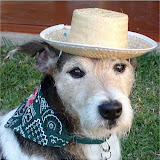É um erro grave e infelizmente muito comum atribuir sentimentos humanos aos cachorros. As pessoas observam o comportamento dos seus cães e interpretam de acordo com o comportamento dos humanos. Isso gera uma grande confusão, bloqueia a identificação do real problema e por consequencia dificulta a correção do mesmo.
O que é interpretado pelos donos como ciúme é na verdade *posse*. Quando o cão se considera o líder da casa, ele pode se sentir o legítimo *proprietário* de uma determinada pessoa. Com a mesma simplicidade que a gente pensa: "essa roupa é minha e eu não empresto para ninguém", o cachorro pensa: "essa pessoa é minha e ninguém chega perto". Algumas vezes o peludo assume que a pessoa-que-é-dele tem o papel de um escravo, cujo único propósito na vida é servir aos desejos do reizinho da casa. Noutras, o peludo assume que a pessoa-que-é-dele tem o papel de par alfa. Se for um cachorro macho ele toma posse de uma fêmea humana e se for uma cadela, ela toma posse de um macho humano.
De forma semelhante, o que as pessoas vêem como vingança, um xixi no lugar errado por exemplo, pode ter várias causas, e nenhuma delas é vingança. Pode ser puro *estresse* por ter ficado sozinho. O coitado do cachorro sofre horrores por achar que o dono pode não voltar nunca mais. Então ele tenta deixar uma "trilha" para que o dono não tenha nenhuma dificuldade em encontrá-lo se estiver passando por ali. Os xixis servem como um aviso de "não esqueça de mim", ou seja, quanto mais, melhor. E de preferência nos lugares em que o dono passa mais tempo, como na cama e no sofá. Para saber mais sobre os inúmeros motivos que levam um cão a fazer xixi no lugar errado, clique aqui.
Em dezembro de 2008 foi publicada uma matéria no G1 com o título "Cachorros são capazes de sentir 'inveja', afirma pesquisa austríaca". Isso me deixou muito intrigada e eu guardei esse assunto na memória para pesquisar melhor quando tivesse um tempinho. Afinal, é bastante comum que matérias em inglês sejam traduzidas para o português de forma absolutamente tosca e distorcendo completamente o texto original.
Hoje eu estava lendo na internet alguns artigos sobre cães quando achei por acaso a matéria original da pesquisa austríaca, em inglês. Pude então comprovar que mais uma vez um grande site de notícias brasileiro não se deu ao trabalho de entender o assunto que estava traduzindo e terminou publicando uma informação errada para os leitores. A reportagem original divulgou que os cães da pesquisa apresentaram um *senso de justiça*, o que em outras palavras significa que os cães foram muito observadores e esperaram tratamento justo por parte dos cientistas. Resultado esse extremamente coerente com a natureza dos cães e que nada tem a ver com inveja (a não ser nas mentes distorcidas dos humanos).
A matéria original está copiada abaixo e foi tirada do MSNBC. Quem quiser comparar com o texto publicado em português pelo G1 deve clicar aqui.
Not just your kids: Dogs can think ‘no fair’ too. Canines, like people and monkeys, seem to have a sense of fairness
By Randolph E. Schmid
Associated Press
updated 11:23 a.m. ET Dec. 8, 2008
What parent hasn't heard that from a child who thinks another youngster got more of something. Well, it turns out dogs can react the same way. Ask them to do a trick and they'll give it a try. For a reward, sausage say, they'll happily keep at it. But if one dog gets no reward, and then sees another get sausage for doing the same trick, just try to get the first one to do it again. Indeed, he may even turn away and refuse to look at you. Dogs, like people and monkeys, seem to have a sense of fairness.
"Animals react to inequity," said Friederike Range of the University of Vienna, Austria, who lead a team of researchers testing animals at the school's Clever Dog Lab. "To avoid stress, we should try to avoid treating them differently." (Muito cuidado aqui: na maioria das situações nós *devemos* tratar os cães de uma mesma matilha de forma *diferente*, dando sempre *total prioridade* para o cão mais dominante. A frase do texto talvez tenha sido mal escrita, mas o que eu imagino que a pesquisadora quis dizer foi que para uma mesma situação, os cães devem ter *recompensas* iguais. O verbo "to treat" significa tanto "dar um petisco" como "tratar"). Similar responses have been seen in monkeys.
Range said she wasn't surprised at the dogs reaction, since wolves are known to cooperate with one another and appear to be sensitive to each other. Modern dogs are descended from wolves. Next, she said, will be experiments to test how dogs and wolves work together. "Among other questions, we will investigate how differences in emotions influence cooperative abilities," she said via e-mail.
In the reward experiments reported in Tuesday's edition of Proceedings of the National Academy of Sciences, Range and colleagues experimented with dogs that understood the command "paw," to place their paw in the hand of a researcher. It's the same game as teaching a dog to "shake hands."
Those that refused at the start — and one border collie that insisted on trying to herd other dogs (hehehe, típico do border!!!) — were removed. That left 29 dogs to be tested in varying pairs. The dogs sat side-by-side with an experimenter in front of them. In front of the experimenter was a divided food bowl with pieces of sausage on one side and brown bread on the other.
The dogs were asked to shake hands and each could see what reward the other received. When one dog got a reward and the other didn't, the unrewarded animal stopped playing. When both got a reward all was well.
One thing that did surprise the researchers was that — unlike primates — the dogs didn't seem to care whether the reward was sausage or bread. Possibly, they suggested, the presence of a reward was so important it obscured any preference. Other possibilities, they said, are that daily training with their owners overrides a preference, or that the social condition of working next to a partner increased their motivation regardless of which reward they got.
And the dogs never rejected the food, something that primates had done when they thought the reward was unfair. The dogs, the researchers said, "were not willing to pay a cost by rejecting unfair offers."
Clive Wynne, an associate professor in the psychology department of the University of Florida, isn't so sure the experiment measures the animals reaction to fairness. "What it means is individuals are responding negatively to being treated less well," he said in a telephone interview. But the researchers didn't do a control test that had been done in monkey studies, Wynne said, in which a preferred reward was visible but not given to anyone.
In that case the monkeys went on strike because they could see the better reward but got something lesser. In dogs, he noted, the quality of reward didn't seem to matter, so the test only worked when they got no reward at all, he said. However, Wynne added, there is "no doubt in my mind that dogs are very, very sensitive to what people are doing and are very smart."
© 2009 The Associated Press. All rights reserved. This material may not be published, broadcast, rewritten or redistributed.


 The dog on the left has not received food for giving the paw in the last trials and observing that the partner (right) did receive food, the subject is refusing to give the paw and avoids looking at the experimenter.
The dog on the left has not received food for giving the paw in the last trials and observing that the partner (right) did receive food, the subject is refusing to give the paw and avoids looking at the experimenter.


















%5B2%5D+532.jpg)

Nenhum comentário:
Postar um comentário